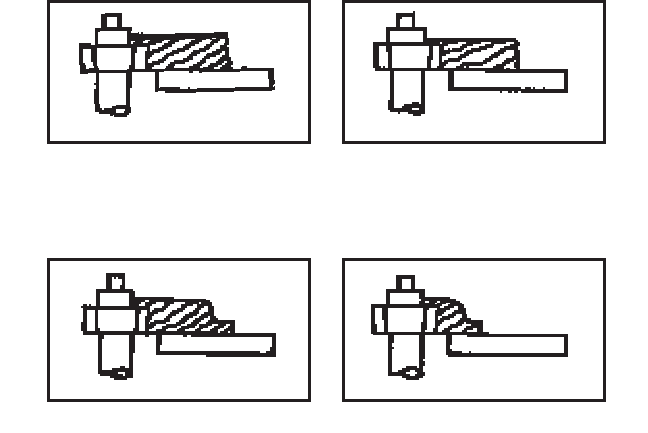
5
6. NEVER RUN STOCK between fence and cutter.
7. WHEN SHAPING with piloted bit, the pilot must have sufficient bearing
surface (
1
…
8" minimum) as shown in Fig. 1. Fig. 2 illustrates the INCORRECT
method for this operation as the pilot DOES NOT have sufficient bearing surface.
8. WHEN SHAPING, the work must be fairly heavy in proportion to the cut
being made as shown in Fig. 3. UNDER NO CIRCUMSTANCE should short
work of light body be shaped as shown in Fig. 4.
9. THE FENCE should be adjusted endwise so the opening is never more
than is required to clear the cutter.
10. CLAMP OR BOLT shaper table securely to workbench to prevent
walking .
11. DO NOT USE router bits larger in diameter than those recommended for
your router (see SELECTING THE BIT).
12. WHEN SHAPING NARROW MATERIAL, use a push stick and make
sure the material is properly supported.
13. WHEN END SHAPING, make sure the material is properly supported by
using a miter gauge or back-up block.
14. SOME WOOD CONTAINS PRESERVATIVES WHICH CAN BE TOXIC.
Take extra care to prevent inhalation and skin contact when working with
these materials. Request, and follow, any safety information available from
your material supplier.
REPLACEMENT PARTS
When servicing use only identical replacement parts.
MOTOR
Many Porter-Cable tools will operate on either D.C., or single phase 25 to 60
cycle A.C. current and voltage within plus or minus 5 percent of that shown on
the specification plate on the tool. Several models, however, are designed for
A.C. current only. Refer to the specification plate on your tool for proper
voltage and current rating.
Fig. 1 Fig. 2
CORRECT INCORRECT
Fig. 3 Fig. 4
CORRECT INCORRECT


















